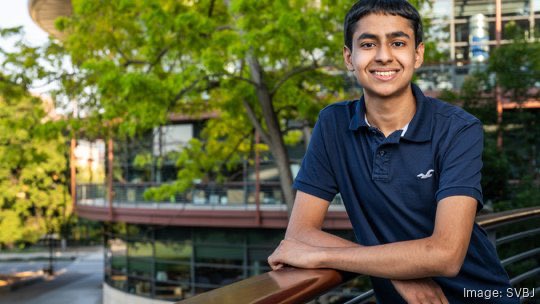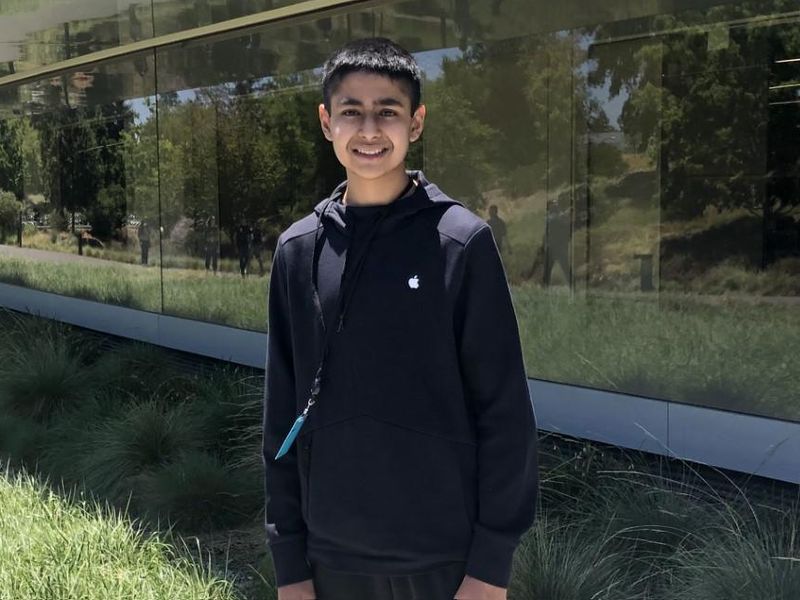(March 31, 2024) “During the Covid-19 pandemic, a single smartphone app averted up to 900,000 covid cases in just Wales and England. This single app reached the smartphones of 21 million people and made an impact by performing automatic contact tracing and helping people feel safe during the pandemic. For every 1 percent increase in the number of this app’s download, there was a reduction in 2.3 percent reduction in Covid cases,” says Adrit Rao during TEDxGunnHighSchool, emphasising the revolution in how innovation can reach people instantly at scale around the world. Palo Alto-based Adrit might be young but he is on a mission to revolutionise healthcare through the use of AI.

Adrit Rao
At the age when most of his friends and classmates were playing with Lego, Adrit was toying with block programming. This was his introduction to computer science and coding when he was only eight. “I found it fun because it was very visual.” Soon he progressed to app development. At 13, the Global Indian began his research internship with Stanford University and soon became one of the youngest students honoured by Apple during its annual Swift Student Challenge for his ability to push the boundaries of technology and provide solutions for people worldwide.
It earned him the chance to meet Apple CEO Tim Cook, a meeting that left him “super excited.” “I was just actually around two to three weeks into my app development journey, Honestly, that experience motivated me to continue my journey,” he said in an interview.
Love for coding and app development
When the Covid-19 pandemic hit the world, Adrit had a lot of time on hand and was keen to explore coding on a deeper level that can help have an impact on people. He turned to YouTube and online resources for additional knowledge and began working on developing apps. “I was inspired by how technology was solving major problems around the world and that’s when I thought of apps on the App Store and how apps are accessible and reach so many people,” he said. He began with MoTV, which was designed as a platform for discovering movies and TV shows. Following its success, he moved on to his second creation, ShopQuik which could determine the wait time at local grocery stores during the pandemic. “I did that so that you could minimise exposure to infectious diseases.”


Later, he went on to develop Signer, an AI-powered app that translates sign language into speech with the help of an iPhone camera. He began by researching statistics on the number of deaf people around the world and the communication gap between deaf and non-deaf communities. “Around that time, Apple had just introduced hand pose tracking and classification at WWDC using their machine learning models. So, I could train my own AI algorithm on that new technology to enable the sign-to-speech conversion,” he added.
Using AI to create an impact
Ever since he joined Stanford for a research internship, he has been building AI-powered apps for healthcare. “I use AI to make the apps work,” he said, elaborating on the two sides of AI. “I have seen what it can do to help, especially in healthcare. Signer itself is proof of the positive impacts that AI has. Just like any powerful tool, it can be used for good and bad,” says Adrit, who is the founder of Aretech Inc, a nonprofit that teaches app development to young people. His commitment to
Currently, he has five apps on the App Store that aim to solve real-world problems and create an impact in society. For the past three years, he has devoted himself to creating inclusive applications that utilize AI for diagnosing vascular diseases. Adrit’s passion for integrating AI into healthcare shines through in his latest endeavour focusing on abdominal aneurysms. He delves into the deployment of cutting-edge models and algorithms for diagnosis and prognosis, underscoring the transformative potential these technologies hold for conventional diagnostic approaches.
Moreover, his remarkable creation, AutoABI, stands out as an iPhone application capable of identifying peripheral arterial disease through the analysis of arterial sounds. This groundbreaking technology is presently undergoing clinical trials and the patenting process. Currently working on its patent, he calls it a passion project. “It showed me how I was able to apply my app development and AI knowledge to actually build a medical solution, which was able to be put into clinics and tested and now has the ability to reach so many people,” he said in an interview.
The high school student, who loves playing basketball, started his journey after stumbling upon an article that opened up a Pandora’s box on the potential of AI to transform healthcare and now years later, he is glad to be working in the field and creating an impact in the world. He believes it’s important to find a problem that is closer to your heart so that one doesn’t leave any stone unturned in finding the solution. “The main goal in developing an app is solving a problem in an accessible manner so that your innovation reaches the people.”
- Follow Adrit Rao on LinkedIn




